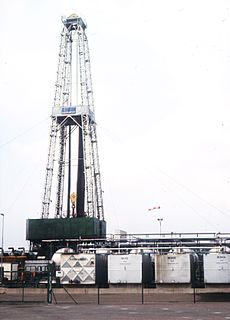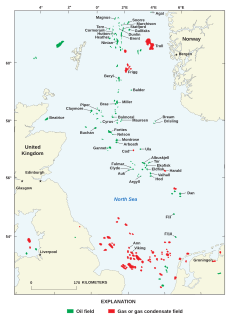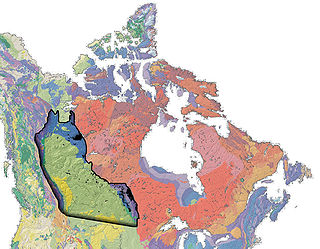Related Research Articles

Petroleum engineering is a field of engineering concerned with the activities related to the production of Hydrocarbons, which can be either crude oil or natural gas. Exploration and production are deemed to fall within the upstream sector of the oil and gas industry. Exploration, by earth scientists, and petroleum engineering are the oil and gas industry's two main subsurface disciplines, which focus on maximizing economic recovery of hydrocarbons from subsurface reservoirs. Petroleum geology and geophysics focus on provision of a static description of the hydrocarbon reservoir rock, while petroleum engineering focuses on estimation of the recoverable volume of this resource using a detailed understanding of the physical behavior of oil, water and gas within porous rock at very high pressure.
Union Oil Company of California, and its holding company Unocal Corporation, together known as Unocal was a major petroleum explorer and marketer in the late 19th century, through the 20th century, and into the early 21st century. It was headquartered in El Segundo, California, United States.

Abraham Pineo Gesner, ONB was a Canadian physician and geologist who invented kerosene. Gesner was born in Cornwallis, Nova Scotia and lived much of his life in Saint John, New Brunswick. He died in Halifax, Nova Scotia. He was an influential figure in the development of the study of Canadian geology and natural history.

Hydrocarbon exploration is the search by petroleum geologists and geophysicists for deposits of hydrocarbons, particularly petroleum and natural gas, in the Earth using petroleum geology.

North Sea oil is a mixture of hydrocarbons, comprising liquid petroleum and natural gas, produced from petroleum reservoirs beneath the North Sea.

The petroleum industry, also known as the oil industry or the oil patch, includes the global processes of exploration, extraction, refining, transportation, and marketing of petroleum products. The largest volume products of the industry are fuel oil and gasoline (petrol). Petroleum is also the raw material for many chemical products, including pharmaceuticals, solvents, fertilizers, pesticides, synthetic fragrances, and plastics. The industry is usually divided into three major components: upstream, midstream, and downstream. Upstream regards exploration and extraction of crude oil, midstream encompasses transportation and storage of crude, and downstream concerns refining crude oil into various end products.

The Railroad Commission of Texas is the state agency that regulates the oil and gas industry, gas utilities, pipeline safety, safety in the liquefied petroleum gas industry, and surface coal and uranium mining. Despite its name, it ceased regulating railroads in 2005.

A petroleum reservoir or oil and gas reservoir is a subsurface accumulation of hydrocarbons contained in porous or fractured rock formations.

The Western Canadian Sedimentary Basin (WCSB) is a vast sedimentary basin underlying 1,400,000 square kilometres (540,000 sq mi) of Western Canada including southwestern Manitoba, southern Saskatchewan, Alberta, northeastern British Columbia and the southwest corner of the Northwest Territories. It consists of a massive wedge of sedimentary rock extending from the Rocky Mountains in the west to the Canadian Shield in the east. This wedge is about 6 kilometres (3.7 mi) thick under the Rocky Mountains, but thins to zero at its eastern margins. The WCSB contains one of the world's largest reserves of petroleum and natural gas and supplies much of the North American market, producing more than 16,000,000,000 cubic feet (450,000,000 m3) per day of gas in 2000. It also has huge reserves of coal. Of the provinces and territories within the WCSB, Alberta has most of the oil and gas reserves and almost all of the oil sands.
A petroleum geologist is an earth scientist who works in the field of petroleum geology, which involves all aspects of oil discovery and production. Petroleum geologists are usually linked to the actual discovery of oil and the identification of possible oil deposits, gas caps, or leads. It can be a very labor-intensive task involving several different fields of science and elaborate equipment. Petroleum geologists look at the structural and sedimentary aspects of the stratum/strata to identify possible oil traps or tight shale plays.

The Ministry of Petroleum (MOP) manages the oil industry, the producer of oil and petrochemical products. MoP is in charge of all issues pertaining to exploration, extraction, exploitation, distribution and exportation of crude oil and oil products. In addition, according to the "Imports and Exports Regulation Act", issuing import licenses for such products is also among the functions of the Ministry of Petroleum. The ministry has been placed under sanctions by the United States Department of State as of 2020.
A Landman or "Petroleum Landman"—in the United States and Canada—is an individual who performs various services for oil and gas exploration companies. According to the website of the American Association of Professional Landmen (AAPL), these services include but are not limited to: negotiating for the acquisition or divestiture of mineral rights; negotiating business agreements that provide for the exploration and/or development of minerals; determining ownership in minerals through the research of public and private records; reviewing the status of title, curing title defects and otherwise reducing title risk associated with ownership in minerals; managing rights and/or obligations derived from ownership of interests in minerals; and unitizing or pooling of interests in minerals.

The Gubkin Russian State University of Oil and Gas is a public university in Moscow, Russia. The university was founded in 1930 and is named after the geologist Ivan Gubkin. The university is colloquially known as Kerosinka, meaning 'kerosene stove'.
Michel Thomas Halbouty was an American geologist, petroleum engineer, and wildcatter. Credited with discovering more than 50 oil and gas fields, he twice declared bankruptcy, but came back each time to regain wealth. He authored hundreds of technical articles on petroleum geology, and two book-length histories of famous oil fields. Halbouty is often described, including in his New York Times obituary, as “legendary.”
Richard Frederick Paynter Hardman, CBE is a British geologist and the doyen of applied petroleum geologists. He remained the President of the Geological Society of London, 1996 - 1998 and Chairman of the Petroleum Society of Great Britain. In a career spanning over 40 years, he has worked in oil and gas exploration as a geologist in Libya, Kuwait, Colombia, Norway, and the North Sea with companies like BP, Amoco and Amerada Hess. Working as an Oil & Gas Drilling & Exploration consultant, he has remained Executive Director, Exploration at Regal Petroleum (2005–2006), Atlantic Petroleum UK, and has been Director FX Energy, Inc., based in Salt Lake City, US, since 2003.
Petroleum licensing or exploration license is the act of giving licenses to a company or a joint venture allowing them to search for commercially feasible deposits for the extraction of petroleum.
Joe Staten Bain was an American economist associated with the University of California, Berkeley. Bain was designated a Distinguished Fellow by the American Economic Association in 1982. An accompanying statement referred to him as "the undisputed father of modern Industrial Organization Economics."
Virginia Harriett Kline was a geologist, stratigrapher, and librarian who was heavily focused on fieldwork.
Dorothy Jung Echols was an American Geologist. She was a Professor for the Department of Earth and Planetary Sciences at Washington University in St. Louis.
The Volga-Ural Petroleum and Gas Province, also known as the Volga-Ural Petroleum and Gas Basin, is a geographical region in southern Russia. Stretching from the west bank of the Volga to the western Ural Mountains, the province contains sizeable quantities of oil and natural gas.
References
- 1 2 Donoghue, David (October 1952). "The Petroleum Dictionary by Lalia Phipps Boone". The Southwestern Historical Quarterly . 56 (2): 335–337. JSTOR 30235134.
- 1 2 3 Merrill, Maurice H. (November 1958). "Manual of Oil and Gas Terms by Howard R. Williams; Charles J. Meyers". Columbia Law Review . 58 (7): 1111–1112. doi:10.2307/1120302. JSTOR 1120302.
- 1 2 3 4 Shepherd, G. Frederick (May 1953). "The Petroleum Dictionary by Lalia Phipps Boone". The Journal of Geology . 61 (3): 282–284. doi:10.1086/626086. JSTOR 30056871.